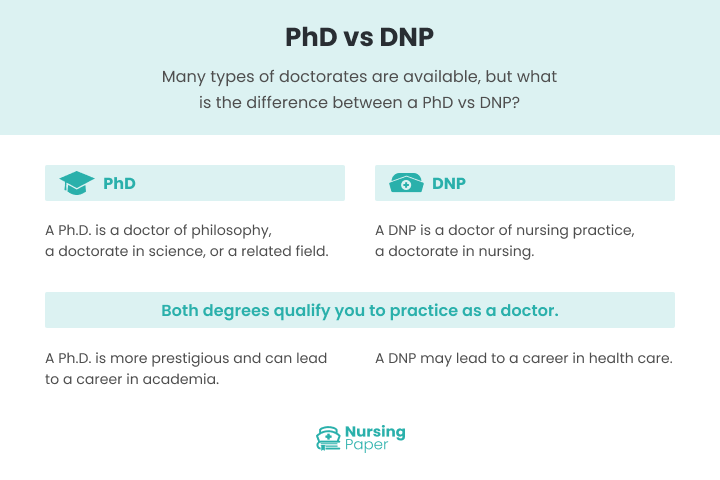What Is the Difference Between DNP and PhD in Nursing – Fundamentals
After graduation, nursing students who gained their master’s degree should decide what direction to move in their studies – to choose a DNP or PhD in nursing. Both of them are necessary to get an advanced qualification in nursing practice, but they use different practices. If you applied to a nursing department at a medical college, you should define whom you want to become – a nursing researcher who’s working on scientific investigations or a clinical nurse practitioner dealing with patients and improving healthcare industry outcomes. So, let’s quickly answer the following questions: “What is a DNP in nursing?” “What is the difference between a DNP and a PhD in nursing?” and “What are the major features of each degree?” Look through the given DNP-PhD comparison attentively to determine each program’s characteristics and decide what is closer to your preferences. DNP (doctor of nursing practice) is a clinical practice qualification, while a PhD (doctor of philosophy in nursing) focuses on research execution. In short, a DNP degree allows working at clinical institutions and interacting with patients. A PhD degree is suitable if a student plans to become a scientist, nurse researcher, or educator.Traditionally, studying a PhD is longer than DNP – as usual, it takes at least 5 to 7 years to complete. In comparison, you can gain a DNP degree and become a nurse practitioner just in 2-3 years. A DNP degree focuses on nursing practice aiming to prepare qualified nurses in healthcare by translating theoretical and research background into practical skills. While studying at DNP, students learn to apply EBP methods, deal with health care improvement via data analysis. Also, they learn to develop strong leadership and executive qualities to provide prime patients’ care as a result. On the contrary, a PhD degree is a research doctorate that prepares nursing scientists who will conduct valuable scientific researches and facilitate area development. The studying course concentrates more on defining chronic illnesses and the directions of the healthcare system. It is mostly a theoretical science that includes studying such disciplines as a philosophy of science, implementing diverse research methods, analysis of data, etc. Weigh the pros and cons of the discussed degrees and decide whether PhD nursing vs DNP will meet your expectations from studying there and bring you the necessary knowledge and qualities to upgrade your performance rate in nursing.Difference Between DNP and PhD Degree Prerequisites
A vital part of the difference between DNP and PhD in nursing is the set of academic prerequisites you need to enroll in each of these educational programs. For instance, to join a PhD program in nursing, you will have to showcase the following credentials:
- A BSN degree from an accredited institution.
- A certificate of successfully passed NCLEX-RN examination (mandatory for nurses working in the USA).
- A Master of Science in Nursing (MSN) degree.
Our Advantages
- Quality Work
- Unlimited Revisions
- Affordable Pricing
- 24/7 Support
- Fast Delivery
Order Now
